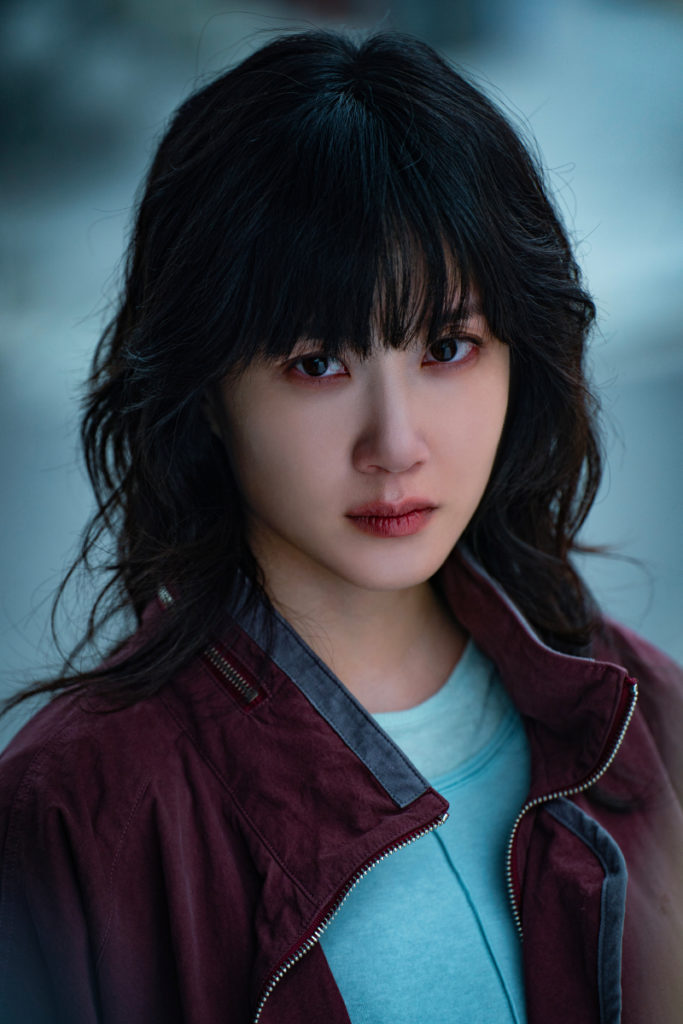
If Park Eun Bin warmed your heart as Woo Young-woo in Extraordinary Attorney Woo, now she’s ready to slice it open in Hyper Knife. The new Korean medical thriller slices through Korean drama tropes like a scalpel: Park stars as Seok, a genius neurosurgeon whose deft skills in the operating room are rivalled only by her taste for perfection and professional self-destruction. One ethical misstep later, and she’s exiled from the medical establishment she once ruled, forced underground and into the company of society’s least savable.
Related article: Kylie Verzosa Is Our April 2025 Cover Star
Related article: Chloe Qisha On Existential Bops, Finding Confidence, & Why Music Needs A Little Darkness
Enter Deokhee, her former mentor (played by Memoir of a Murderer’s Sul Kyunggu), now the one asking her for help. What follows is part psychological duel, part operating-room opera, with a healthy dose of revenge served in surgical steel. Forget clean incisions. Hyper Knife is messy, complicated, and a total adrenaline rush.
In this ELLE Singapore exclusive, Park and Sul Kyunggu dissect more than just their characters, sharing sharp takes on their on-screen dynamic, the off-screen camaraderie with castmates, and the meticulous precision that went into building Hyper Knife’s high-stakes surgical world.
What is Hyper Knife about?
Sul Kyunggu (SK): On the surface, Hyper Knife is a medical crime thriller, but as you begin to get into the series, you’ll find it’s actually a blend of multiple complex genres. At its core is an unconventional story about a mentor and a student. Deokhee, the mentor, betrays Seok, a student he once deeply cared for. Some years later, Deokhee finds himself in a personal crisis and seeks out Seok. Hyper Knife portrays the tension and love-hate dynamic between these two characters.
What can you tell us about your character, Jeong Seok?
Park Eun Bin (PEB): Seok is a genius neurosurgeon who loves studying and operating on the human brain. Due to a turn of fate, she’s now a struck-off doctor working in the shadows. Getting to know her was a fascinating process because of her unique personality and tendencies. I had a great time filming the series.
Related article: STAYC Redefines K-Pop with [S]: A Bold Fusion of High Fashion & Sonic Innovation

Your character in this series, Deokhee, is a world-class neurosurgeon respected by everyone, but who also has a different side to him. What was your focus when portraying the duality of this character?
SK: He’s a globally renowned brain surgeon but carries a darkness within him. While highly respected by many, he maintains few personal relationships. I remember mentioning during filming, that “Deokhee feels like a person isolated on a remote island. He seems trapped there.” I described him that way because he is disconnected from society and isn’t adept at any aspect of life outside of his professional field.
I knew that keeping the character dark and serious from episode one through eight would bore the audience, so I took a different approach. I approached him as someone who is ultimately as clumsy as anyone outside of his field. I put the extra effort into searching for and finding that awkward side of him.

Why did you choose to work on this project?
PEB: I always thought that if I continued acting, I would eventually play a doctor. Out of all the medical specialties, I was particularly interested in neurosurgery, so that was definitely a plus when I heard about Hyper Knife. The character also has so much more depth and complexity than the doctors you usually see portrayed on TV. That made the role even more rewarding. It motivated me to explore and portray the complexities of both her inner and outer world.

What was it like portraying a doctor for the first time?
PEB: It was fun. In addition to scenes where my character operates on patients, there are brief moments where you get to see an earlier phase of her life where she assisted other doctors in the operating room. I quickly came to realise how demanding the job can be. When you’re assisting a doctor, you have to stand the whole time. At least a neurosurgeon gets to stay seated while operating. Some of the surgery scenes we shot took six hours to film, and others up to ten. I was grateful to be able to play a doctor and get to sit down during these scenes.
We also used real medical equipment, including microscopes and bipolar forceps—which can cost KRW 5 million ($4,550). In fact, the consulting doctor asked the team where all the equipment would go after production wrapped. Everything was state-of-the-art, and the zooming power of the medical-grade microscope was incredible. Having access to all that equipment was a fascinating experience. For the surgical scenes, we couldn’t use a stand-in for my hands, so I had to perform the surgical gestures.
This was your first time acting with Park Eunbin. What was it like working together on this series?
SK: I always enjoy working with my colleagues. I typically don’t call them. In fact, I try not to discuss work off set because, being more senior in the field, initiating such conversations might come across as me imposing my opinions or pressuring junior colleagues to share my views. But with Eunbin, I had more phone calls about work with her than with anyone I have worked with. I believe our phone conversations contributed, to a certain extent, to steering the series in the right direction. I rarely have phone conversations with writers either, but thanks to my conversations with Eunbin, I even got to speak with the writer over the phone.
Through the phone conversations I had with Eunbin, we were able to convince both the director and the writer to slightly adjust certain aspects of the series. I’ve been acting for over 30 years, but Eunbin has had such a positive influence on me, helping me become more actively involved. I enjoyed receiving that youthful energy from her. To return to your question about our working chemistry—I had more phone conversations with Eunbin than any colleague in my entire career.
Related article: Exclusive: First-Time Author Jemimah Wei Reveals The Long, Tumultuous Journey Behind The Original Daughter

While Seok has immense respect for Deokhee, she also resents him for ruining her life. What was your biggest focus when portraying this duality of emotions?
PEB: I believe the more you care about someone, the greater the potential disappointment. I interpreted Seok’s hatred towards Deokhee as being rooted in the affection and respect she once had for him—which is connected to their shared passion for the study of the human brain. I didn’t find it challenging at all to relate to and portray Seok’s blend of love and hatred. All in all, I don’t think I’ve ever seen a mentor-student relationship as strange and as twisted as this. I hope viewers find it as fascinating as I did.
What was your focus when portraying this mentor-student relationship, and what do you think Seok means to Deokhee?
SK: In the script, the two characters are often described as two sides of the same coin. From their childhood to their journey entering college, the way they are stuck in their own worlds, and even their shared love for brain surgery—Deokhee recognises these traits in Seok. He initially pours his care into her, promising to teach her everything that he knows. Perhaps he did that because he saw part of himself in her. However, Deokhee is also incredibly petty and unforgiving, so he banishes Seok from the medical field for a single mistake she makes. He wielded his authority and power against her—to remove her from the field so that she could never return.
Years later, he faces a personal crisis and seeks out Seok, regretting his past decision. Deokhee is not one to admit his faults publicly, but in the end, he does try to fulfill his initial promise of passing on all his knowledge to Seok. What is intriguing about their dynamic, though, is that they hold a figurative leash on each other’s life. In this complex relationship, they feel both affection and hatred for each other. I hope that the series captures these nuanced emotions.
For the first time in a Korean series, struck-off doctors are featured as a key premise of the story. The attention to detail in the production design was impressive, especially with sets like the makeshift operating rooms. Can you share your thoughts on the production aspect of the series?
PEB: The production cost a fortune, and a significant investment was made into building the large-scale sets. The operating room—which I once thought would be the main set I would perform in—was constructed to such an amazing standard. But once I received the full script, I realised my character would be moving between makeshift operating rooms. I was a bit disappointed and sad that I couldn’t take full advantage of such an amazing set.
I also didn’t know my character would be travelling so much. I think the production team paid a lot of attention to scouting the right locations to ensure that my character’s makeshift operating spaces, while illegal, were still believable and safe enough for brain surgery. The most memorable set for me was the operating room on the ship. All the components went up at the same time.
SK: The set and production design throughout the series is particularly impressive. We consulted a medical professor on the setup of the operating rooms, and nurses with experience in operating rooms also visited the set to ensure accuracy. We also had a doctor on set throughout the surgery to ensure the procedures were depicted as accurately as possible.
What sets Hyper Knife apart from other medical thrillers?
PEB: Knife doesn’t focus on doctors who are looking to save their patients’ lives, but rather, it focuses on doctors who are consumed by an obsession with their craft. Because I saw this as a story about people who are driven to madness by their passions rather than being motivated by a sense of calling or duty as a doctor, I remember thinking to myself, “How can someone be so crazy about something with this level of intensity?” I hope that viewers can experience the intense, sometimes unhinged, character dynamics and emotions as they watch the series.
SK: The mentor-student relationship portrayed in the series is unlike any other seen on TV up until now. It’s so unconventional, especially the way the student is characterised. Seok exhibits a lot of provocative behaviour, much of which stems, I believe, from Deokhee’s provocations. Their dynamic is unique and may even shock viewers who are used to traditional mentor-student relationships.
If viewers focus on this unconventional nature of their mentor-student dynamic, their experience with this series will become much more entertaining and convincing. The initial part of the story may not be instantly relatable, but as the story progresses, I think audiences will gradually come to understand this unconventional dynamic.
What impression has Hyper Knife left on your personally?
SK: This is my first time acting in a medical-themed series. I had never worn a white coat before this project. Wearing it, I felt more like a barber than a doctor. Feeling a little awkward, I would jokingly say on the set, “Don’t I look like a barber?” I realised that, in over 30 years of acting, I had never played a doctor until this project. I hope this remains the only time I do it, which I think it will. I hope this will be a strange, yet different experience for viewers. I hope it’s remembered as an unpredictable and intriguing story.
Hyper Knife is streaming on Disney+ now.
